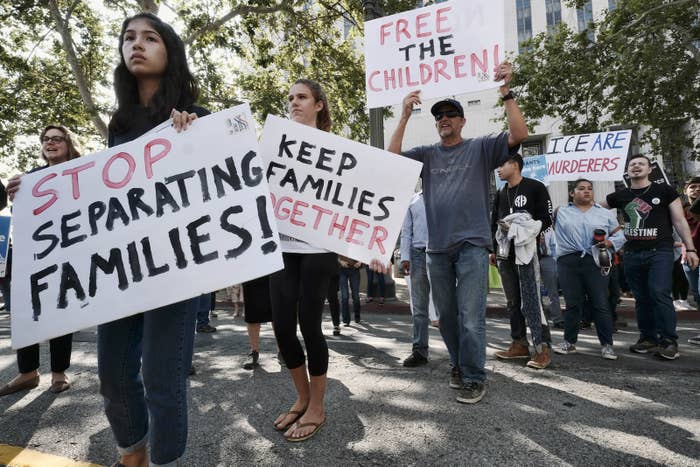
The parents of as many as 468 children, who were separated from their mothers and fathers at the border, were deported by the Trump administration, according to statistics made public in a San Diego court hearing, and now US authorities must figure out how to reunite them — or whether to reunite them at all.
Authorities also must find the parents of 43 children who apparently were released into the United States, but whose whereabouts the government has lost track of —more testimony to the lack of record-keeping that has plagued the Trump administration's family separation crisis from the beginning.
Those numbers were made public in court on Friday at a hearing in San Diego where the government declared that it had successfully reunited 1,820 families by the court's July 26 deadline. Most of them were then allowed to go free in the US — an ironic conclusion to two months of chaos caused by the administration’s efforts to prevent that very outcome.
Deputy Assistant Attorney General Scott Stewart told the court that the number of parents outside of the US doesn't necessarily include only those who were deported without their kids. But his answer also was a reminder that US officials simply don't know; Stewart at first used the number 431 for how many children had parents who were outside the US; later in the hearing, he said the number had risen to 468.
"We are still getting more granularity there," Stewart said.
US officials offered no explanation for the higher figure. How those parents and children will be reunited remained uncertain.
According to court documents filed Thursday in San Diego federal court, the Trump administration reunited 1,442 families where a parent was still in the custody of Immigration and Customs Enforcement. Another 378 children were either reunited with a parent who already had been released in the United States, placed with a sponsor, reunified with a parent in custody earlier in the process, or had turned 18 and were no longer minors, according to the documents.
Lee Gelernt, the lead attorney for the parents and deputy director of the ACLU’s Immigrants’ Rights Project, which sued the federal government to force the reunification of parents and children who'd been separated from one another at the US border, declined to comment on the number of kids whose parents were outside the United States.
He said he was "thrilled" for immigrant families that had been reunited by the deadline. Still, in court he chastised the government for not giving the ACLU enough information to track down deported parents.
"We are just asking for as much information as possible. Unless the government is going to tell us, 'We will find all 400-plus of those parents,' it is going to fall on the NGOs," Gelernt said. "So we just need every bit of information they can give us. And we will take it on a rolling basis, but we would just start — we would just want to start looking."
Stewart said the government had already given the ACLU a "fulsome" list of the deported parents, including their names, the dates on which they had been arrested trying to enter the country, the dates on which they were removed from the United States, and the country they were returned to.
"I am going to stand very firm that the government has worked very, very hard and put in tremendous hours to give Mr. Gelernt the information that he says he does not have," Stewart said.
Gelernt said he also wanted any contact information the government has, any notes they took, and anything else that could help track down deported parents. Ultimately, US District Judge Dana Sabraw, who is hearing the case, said he will issue an order setting out additional information the plaintiffs are entitled to.
Sabraw commended the government for reunifying 1,820 children with their parents.
"The government deserves great credit in that regard," Sabraw said. "The government is at fault for losing several hundred parents in the process, and that's where we have to go next."
Sabraw also told the government that it must come up with a procedure to make certain the confusion of the last two months doesn't happen again. He noted that immigrants will continue to try to enter the United States.
"This problem cannot repeat," Sabraw said.

